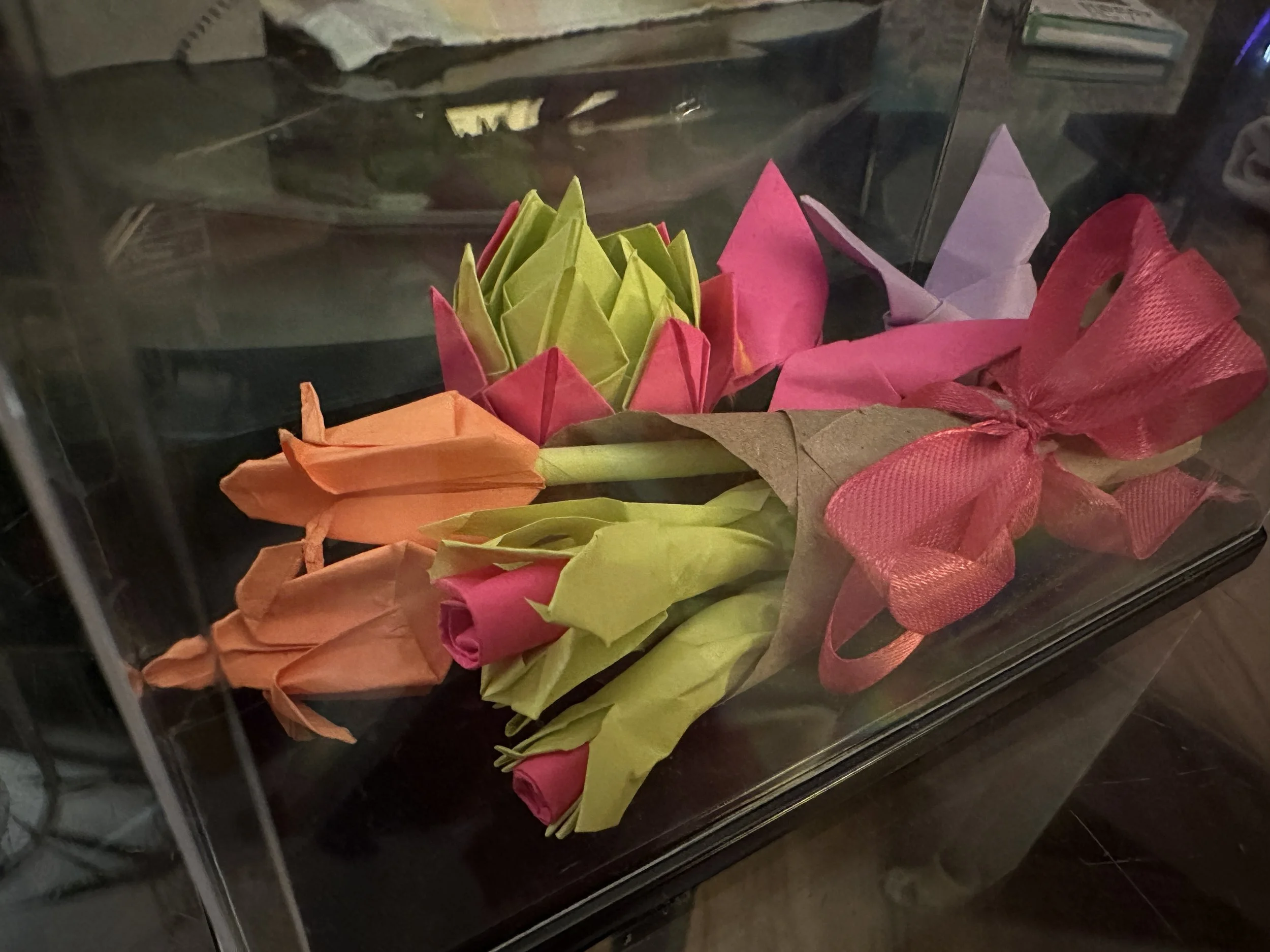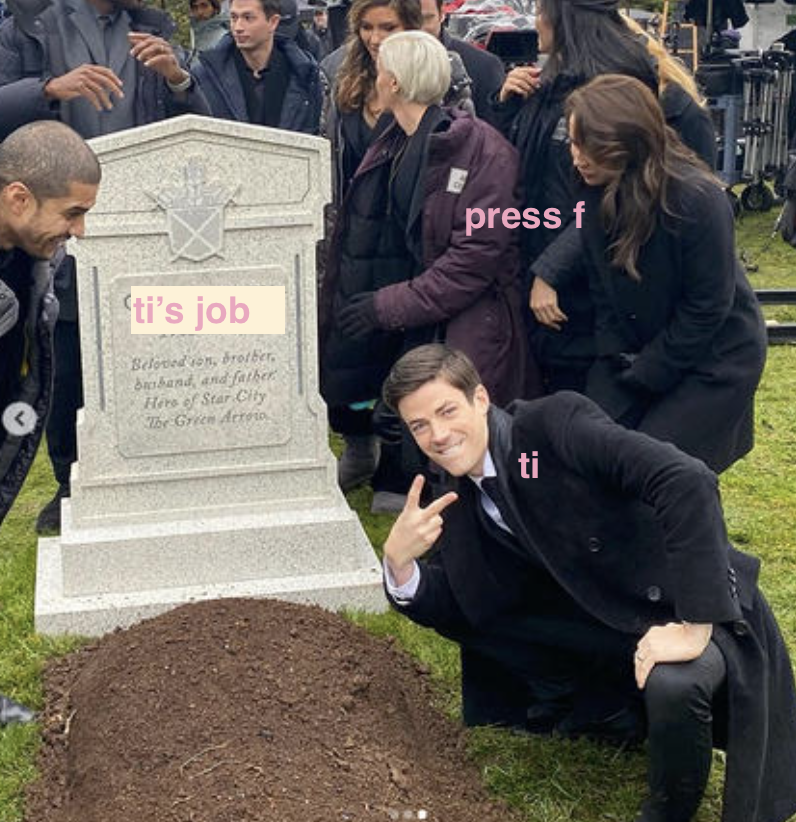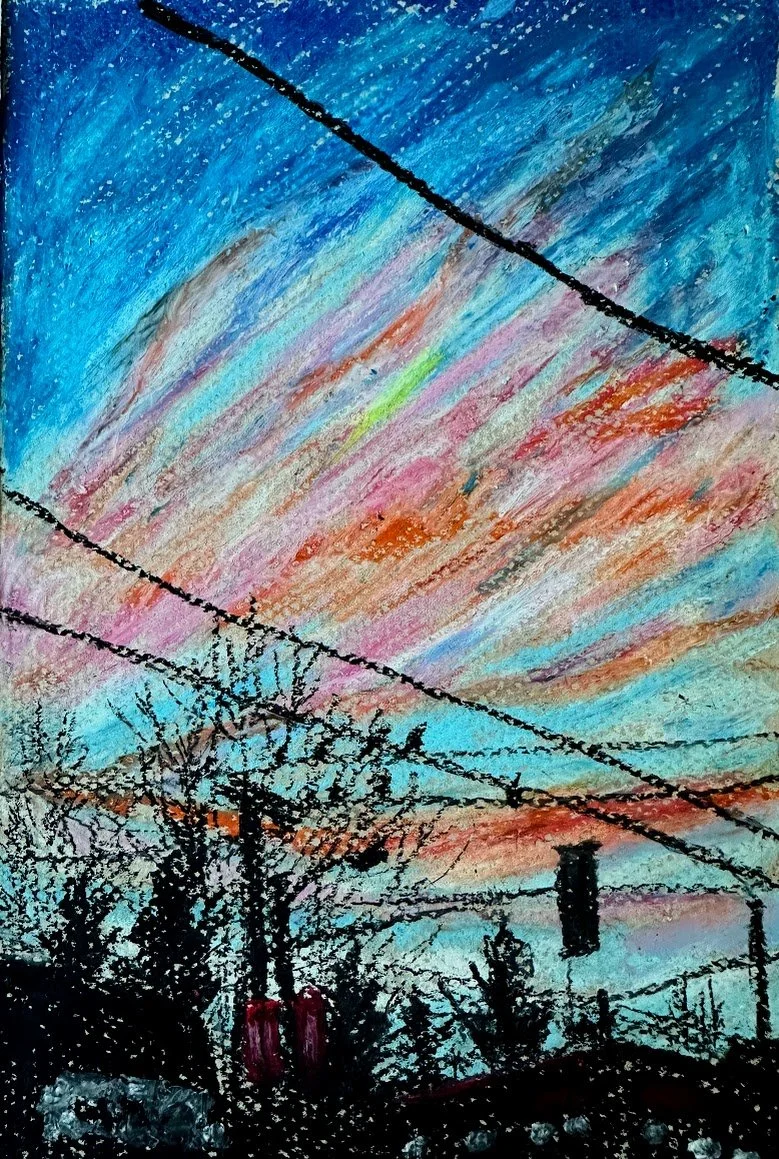Around September 2023 I hit a downward spiral, working too hard and eating too little. Unintentionally, I’d lost 30lbs, which was a lot for a 5’1’’ person. Hitting goals, getting things done, consolidating project milestones and checking off things that mattered, but what really mattered? I thought I was ruthlessly prioritizing, but rapidly I deteriorated. In November I fell ill and ended up in urgent care. As a single parent in tech, it had been a while coming. Everyone else saw it before I did, I was running on fumes – frankly with the level of performance I was hitting on top of the parenting duties, it’s a miracle I did not collapse sooner.
Everything has a price and my price comes in the form of a weird little 3 cm mass that we now need to investigate – is this cancer or not. I’m not super pressed about it, a lot of cancer is manageable with current science. My mother was afflicted with adenoid cystic carcinoma, she was diagnosed at the age of 46, and passed away at the age of 51. The oncologist I saw has let me know that I potentially have something just as rare, but of course there is a good chance it is nothing. Since I’ve been having symptoms for around a year or two, it is not aggressive enough to do major damage to me right away.
I’m grateful to my workplace for being able to go on a five-month medical leave with partial pay. This time-off may have potentially saved my life. Around the time when it all started, I was not convinced that I would physically survive this. I would collapse from being unable to hold myself up, one time it happened in a parking lot, my vision white static, shuddering in pain and cold sweat, so weak my partner had to hold me up by the arms. There were also times when I could not conjure enough energy to move my limbs or sit upright. I ended up using a cane for a few months. Having exercised diligently for most of my adult life, I suddenly could not walk for five minutes without needing to sit down and catch my breath.Each human is a complex system, and I was one that had depleted my own stock.
My brain was in a jumble too, I couldn’t figure out the most simple things – I’d experienced a cognitive injury. Burnout slammed into me like a bag of bricks and stomped all wherewithal out of my brain. Miraculously I was able to handle parental duties – cooking, cleaning, drop-offs, pick-ups. I was barely making things happen but it was happening: ten years of single parenthood, many things became muscle memory. It must have been miraculous timing that I’d met someone and fallen in love just before all this – my long-distance partner drove seven hours from Portland every few weeks in order to support me.
Neighbours, friends, current and former coworkers all chipped in with things like garbage, groceries, school pick up and drop off. But anything new was impossible - my partner got me ice bags to aid with my autistic shutdowns, yet it was weeks before I realized why they weren’t working right: I did not remove the packaging. My brain was too broken to figure out that a product needs to be out of the package to be used. I would sit down to watch TV, but could not figure out how to work the remote. I would read or try to listen to a podcast, but nothing was registering. Pain and fatigue was all I knew, I struggled to make it through a single day. I would listen to music but music would be too overstimulating for me. I’d hit a wall of autistic burnout
However, gradually I got better. Tons of therapy, introspection, confronting myself, talking to people who love me. Looking back, looking forward, looking within. I’m walking out of this experience with lessons in hand, and I’d like to share them with those who may resonate.
What It Means To Give 100%
There is this myth of the coasting worker. I’m sure those exist, but certainly not in my circle. Humans need intellectual stimulation, we need meaning and joy in work. People go out of their way to find this, so oftentimes we find ourselves giving more than we can afford. Research shows intrinsic motivation is what gets things done, rather than extrinsic motivation. When we figure out ways to align work with our internal beliefs, work becomes play. This is incredibly important – how else will we find joy in a capitalistic society of non-stop churn? If you must do it, then enjoy it, figure out ways to enjoy it.
My downfall was to enjoy it a little too much. Giving it 100% meant at the end of the workday I was in zombie mode. I would log off, pick up my kid, cook, clean, and have a bare minimal conversation with my kid then put them to bed. It felt like a second job, I did not reserve any energy to spend time together, I spent it all at work. Every school email correspondence felt heavy, everywhere I turned it was just obligations. As it turns out, I was giving more than 100%, I was in deficit.
There is always this push-pull when it comes to work and personal life, it’s the perpetual problem we are all trying to solve in our own way. I think I should have deliberately reserved some brain for after work – especially for an autistic person, this means allocating cognitive resources around socialization. My kid deserves more than a churned out mom.
Fortunately during my medical leave we have really come together and had a lot of good conversations. This has been a good learning experience for them too.
Who We Work With is More Important Than What We Work On
As a complex systems thinker, solving problems brings joy in and of itself. A pattern in my career is I end up owning problems in different domains. The domain itself does not matter, I can handle identity, integration, cloud computing, platformization, networking, observability, DNS, big data wrangling, generic API things, infrastructure as code – at the end of the day a complex systems problem is a complex systems problem, and my job as a software engineer is to apply pattern matching abilities, which are transferable across domains. I used to think that it is the content of the work that brings me joy, but looking back I realize at every job it’s always the incredible people I meet that made it worth it.
When you deal with chronic pain, a lot of thinking happens. I combed through the good and bad moments that got me where I am, and really realized that a job is a good job because of the people. I relish in the intellectual honesty and rigour, sparks in thought exchanges, I have so much fun with the good people I work with, and they are what makes it matter. This is probably why I like to make software for software people – be it a customer-facing product or an internal tool, I love seeing the impact of my work on its users.
I know there is this school of thought that’s like “don’t make friends with your coworkers”, but I’m not a fan of that. Surely not every coworker is your friend, but many friends come from coworkers. During my medical leave, I’ve received helping hands from so many coworkers, both current and former. At this point, they are friends I work with or would like to work with. For the next steps in my career, I’d like to continue working with good people. Any problem can be interesting, but good teams are the foundation for good communities, and good communities are how we can continue to build and shine in a fast-paced world.
Internal Exhaustion
I learned about this from the Chinese internet. Where 996 rose to become a paradigm (and subsequently officially suppressed), wisdom arose from the community. I was introduced to this concept called 内耗 – internal exhaustion. When you are experiencing internal conflict, you are spending energy being torn, and that energy expended adds on top of everything else. If we can come to peace with how we are, who we are, what we do, why we do, we put an end to the internal exhaustion. No more feeling bad about being at work and thinking of unfulfilled personal obligations, and no more feeling bad about being unproductive when taking a rest. When we clock in to work, we give what we can reasonably give while maintaining system stasis and health. When we clock out, we do not feel bad about clocking out. When we are committed to a goal, we do not doubt it – we may stop to reevaluate ever so often as it is healthy, but the reevaluation is to be done with an intended outcome. Every decision we make and every path we take comes with tradeoffs, embracing the consequences full-heartedly after rigorous study and preparation is how we achieve maximum efficacy and joy.
Mindful and Malleable Attachment to a Project
This is a problem everyone experiences at one point or another in their career. When we seek meaning in work and let work define our identity, we are getting attached to the projects we do. We end up seeing the success and failure of projects as personal. This is a dangerous way to be because while it is healthy to align personal growth goals with organizational growth goals, there is no way for executors to fully understand and predict organizational movement paths.
In business we are solving ill-defined problems(I’m using the definition by Walter Reitman in "Heuristic decision procedures, open constraints, and the structure of ill-defined problems", Human Judgments and Optimallty. Wiley, N. Y. 1964) everyday. People in strategic leadership positions are responsible for defining the start state, end state, and operators of ill-defined problems, transforming ill-defined problems to well-defined problems. This is often a painful and drawn out process, and healthy outcomes involve a lot of information exchange both horizontally and vertically. A flip side to this is often executors do not see the full picture, macrosystem conditions and demands can change the problem definition or even what problem to solve; also sometimes the boundaries between executor and strategy definer can be ambiguous, which adds to the scope. Therefore, when we get too attached to projects, we lose the flexibility to run with the ever-changing problem definition and identification of problems. A healthy organization requires its executors to have malleable and mindful attachments to projects, in Chinese we call this 拿得起放得下: one can pick it up and put it down. Another saying in Chinese: 在其位谋其政,任其职尽其责 - holding the position means thinking about the responsibilities relevant to that position, thorough thinking about that very position yet not beyond that. Sometimes overextending creates a cost, and that cost was my health. My problem was I had a hard time putting down projects when it was time to, and I worked myself into a corner.
Mentorship Necessitates An Experiential Component
There are two types of people in the world, those who say “hey I went through this, it was awful, now you don’t have to”, and those who say “I went through this, it was awful, so it’s only fair you go through it too”. I think of impactful and community-minded mentorship as the first type of people transferring skills to enable more people like these. I still think this applies – but I’ve changed my mind on the specifics.
There were things I did right and will continue to do as a mentor: provide opportunities, give space, dive in and out as needed, create a psychologically safe space for asking for help and for challenging. This also requires a healthy environment that can tolerate mistakes, because sometimes mentorship is about letting people make mistakes. To have the room to grow, people need to be able to make mistakes, but also be entrusted with things with the expectations that they will very likely succeed. The combination of trust and the room to make mistakes is what grows goodness, this holds true in both parenting and mentorship/coaching/friendship/relationship.
There were things I will refine, which I sat with for a long time. A lot of lessons and learnings are ineffable – without having the experience, stories just do not hit. Repeating yourself does not mean things will be heard, sometimes it really is about creating the space to have the experience, then surfacing the pattern and lesson for the learner. The learner has to have the mindset to receive in order for the lesson to be heard, and a lot of the times the environment is not set up for that, then more verbal teaching just ends up being very preachy. This would not constitute effective mentorship.
Learning is Implicit , and Trauma Recovery is Eventually Consistent
When I ended up in urgent care, I’d thought it was my body that was broken: I was in pain, I could not eat or sleep. I could not move. My joints ached, everything hurt. I hit a wall in terms of system exhaustion and somehow I had enough hubris to believe that my brain was unaffected – I was wrong. My brain was broken too. I realized this the day after I went on medical leave. My partner had accompanied me to urgent care, then they had to drive back to Portland. They were in town for a week so I could go to Kubecon, and right after Kubecon I had collapsed. They had their own life too – we decided it was healthy for them to drive away even though it was clear I was in no shape to handle a household. In hindsight it was a good decision, the solitude gave me time to think, and like aforementioned my community came together to catch me in distress, so I was not really alone after all.
It was a sunny day, rare for Vancouver in November. The air was crisp and you could smell the fall. I’d dropped off my kid at school and struggled to boil myself an egg for lunch – the fatigue and pain combined was so much, and there was a lot of paperwork I needed to do in order to actually start my medical leave – a lot of appointments, emails, phone calls. It was all so daunting, and I didn’t know whether I was making the right choice. I ate my boiled egg slowly, it tasted and smelled very rotten. I quietly began to panic and was convinced that this was parosmia from COVID . For a very brief yet very perpetual and still moment there, I believed I had caught COVID from Kubecon and had given it to my kid and my partner, all as a result of building my career. Time stood still for me while the crisp autumn air blew through my balcony doors, and I sat there eating my rotten egg for a while.
Then I realized that I had switched to a meal service instead of cooking weeks ago, because I’d had no time to cook or eat, so I was drinking soylent and eating baby food and giving catered meals to my kid. As a result the eggs in the fridge were very old and no longer good – the eggs were actually rotten, I did not have COVID. I was, however, completely and thoroughly burned out, body, mind, and soul. I got up and threw away the rotten egg, then I cried and decided I was going to work on fixing what’s broken.
For the next few months I focused on getting well. I threw all my available energy at navigating the collapsing Canadian healthcare system, weekly therapy, physiotherapy, introspection. Lots and lots of conversations with my partner, my kid, my dad, and my friends. I’ve reconnected with people, mended connections lost to the overwhelming anthem of work. Slowly the fatigue got better and I was able to walk around without a cane again, and then the pain began to get better too. Leaf by leaf I turned over all three decades of my time on earth and figured out a lot of things I did not want to confront, connected the pieces and put them together. I worked so hard on myself, all the energy that went to work went to me, and as a result I am more ready for work than ever – and work is what I enjoy, frankly. The brain needs food, I am under stimulated if I am not intellectually challenged. I did nothing wrong in deriving meaning from work, what I could have done better is where to draw the line.
This was a painful process: facing things I’d forgotten, confronting decisions I’d made and making peace with them. Processing trauma with an inward facing stance means we are building power from within, but it takes time. There were moments where I wondered if I would ever recover, but those passed and I found my footing.
Most of the learning we do is implicit (see research), and incubation is key to creativity(more research). This is why trauma recovery is eventually consistent: if we keep doing the right things, the complex system that is our brain and body will work with us and catch up. While we do things like rest, enjoy ourselves, introspect, journal, art, talk with friends, look at sunsets, our brain and body is running background daemons to patch things up. Give yourself the time and space to breathe and relax, lean into it and recovery will happen. I’m glad I was patient with myself.
Don’t Forget: We Are Here to Look At Sunsets and Clouds
The day after I ate the rotten egg I walked to pick up my kid from school. The walk that used to take me less than 30 minutes took me an hour, and by the time I got there I was sweating and near throwing up. I had not done that walk in months as work picked up pace, and I remember that walk clearly. I’d looked up and realized it was the end of autumn and we were heading into winter. I’d missed an entire fall, how could I let that happen? When my partner traveled to Rome for an offsite and asked my kid for what they want, my kid said “picture of clouds”, and that made me so proud. Stopping and taking pause in clouds and sunsets is what we are here for, and the meaning of life is what we make of it, what a loss that I had almost forgotten it myself. I will continue to work the way I work, I will continue to derive meaning from work, but I will not make work my meaning again, that’s for sure.
The sunset during that walk was heartbreakingly stunning. I took a photo of it as I looked at the sky the way I should with an artist’s eyes for the first time in months. Here’s an oil pastel drawing I made from that photo. I hope my lessons are of help to others who are also forgetting to look at sunsets.



